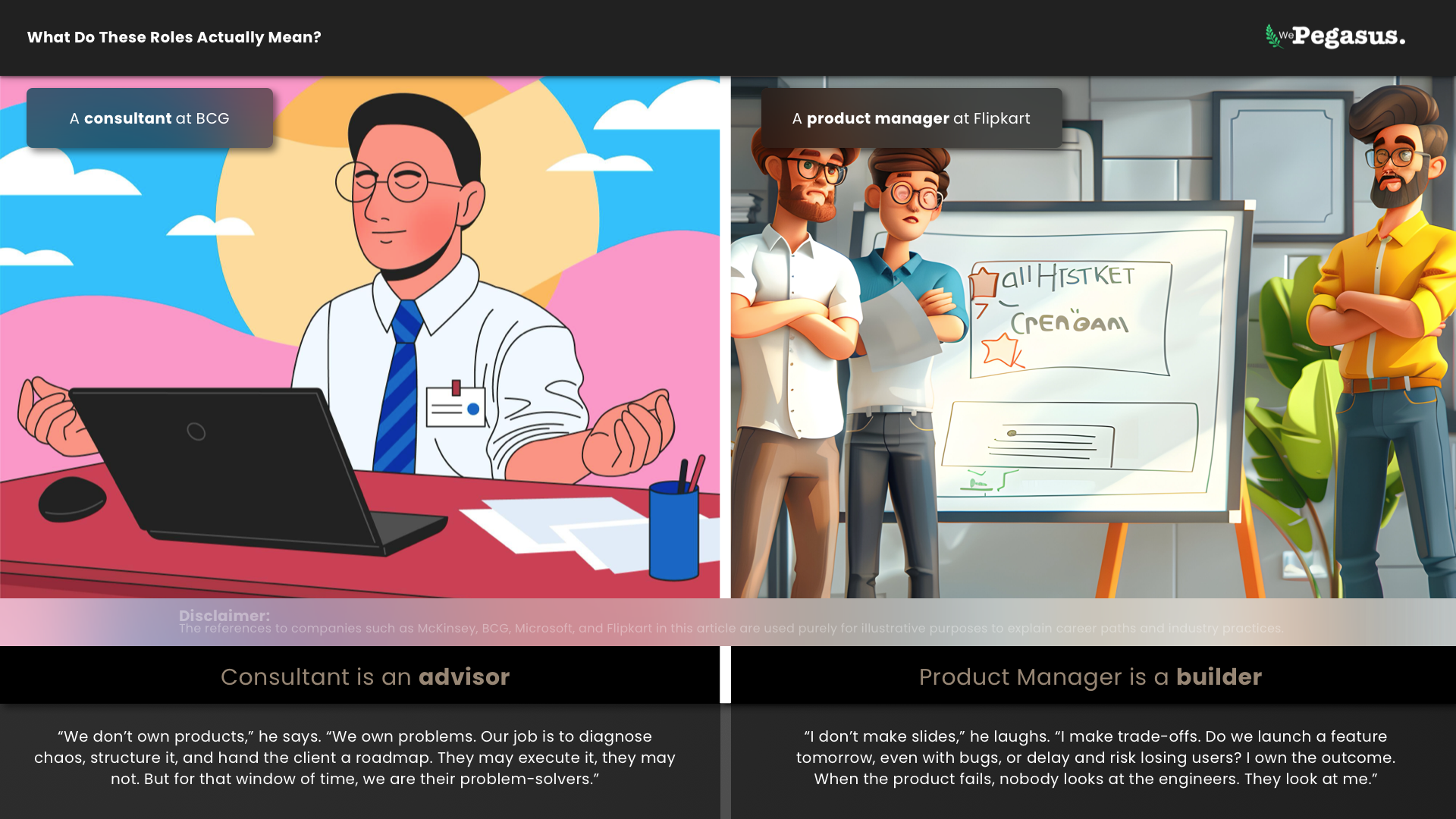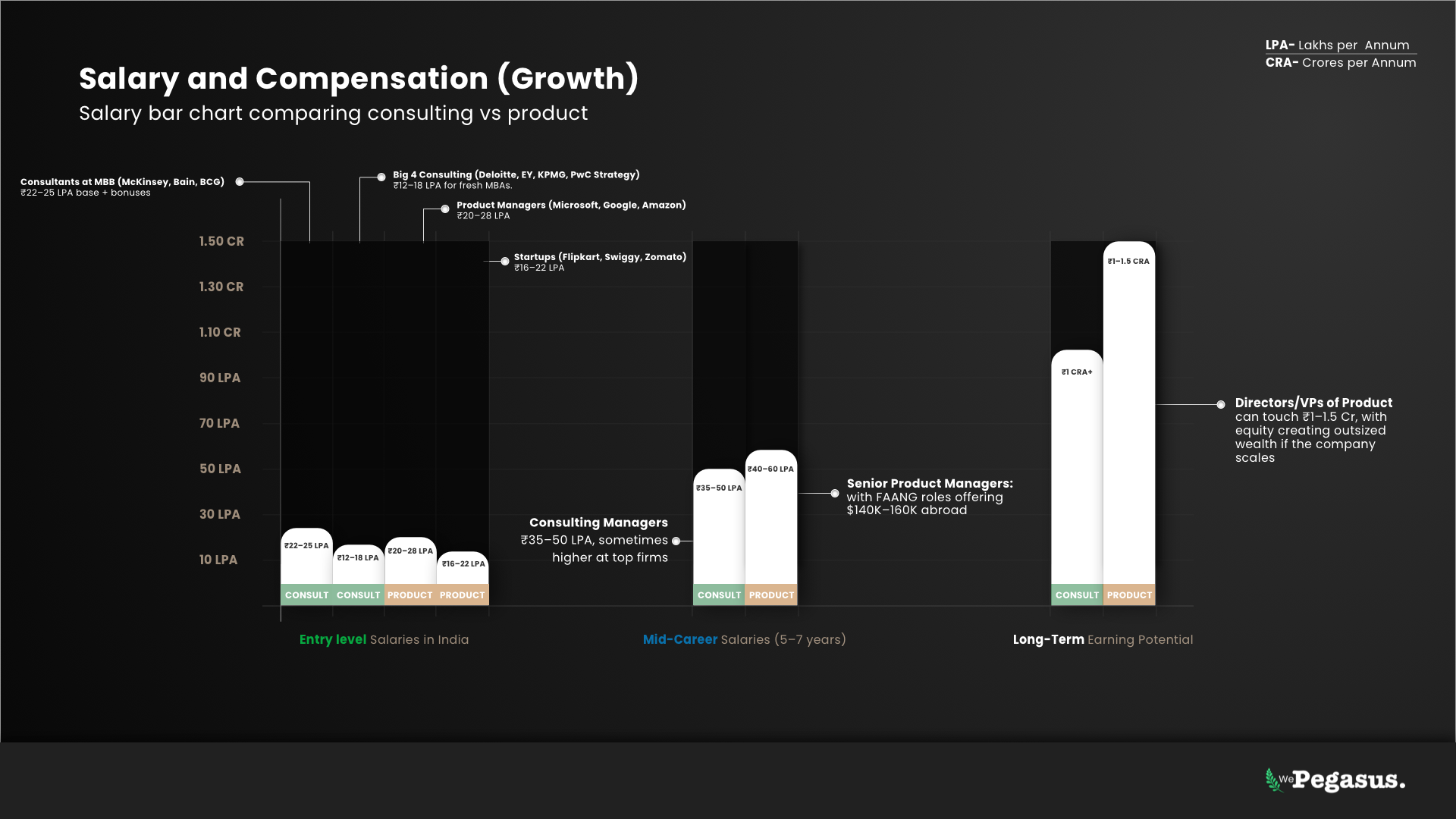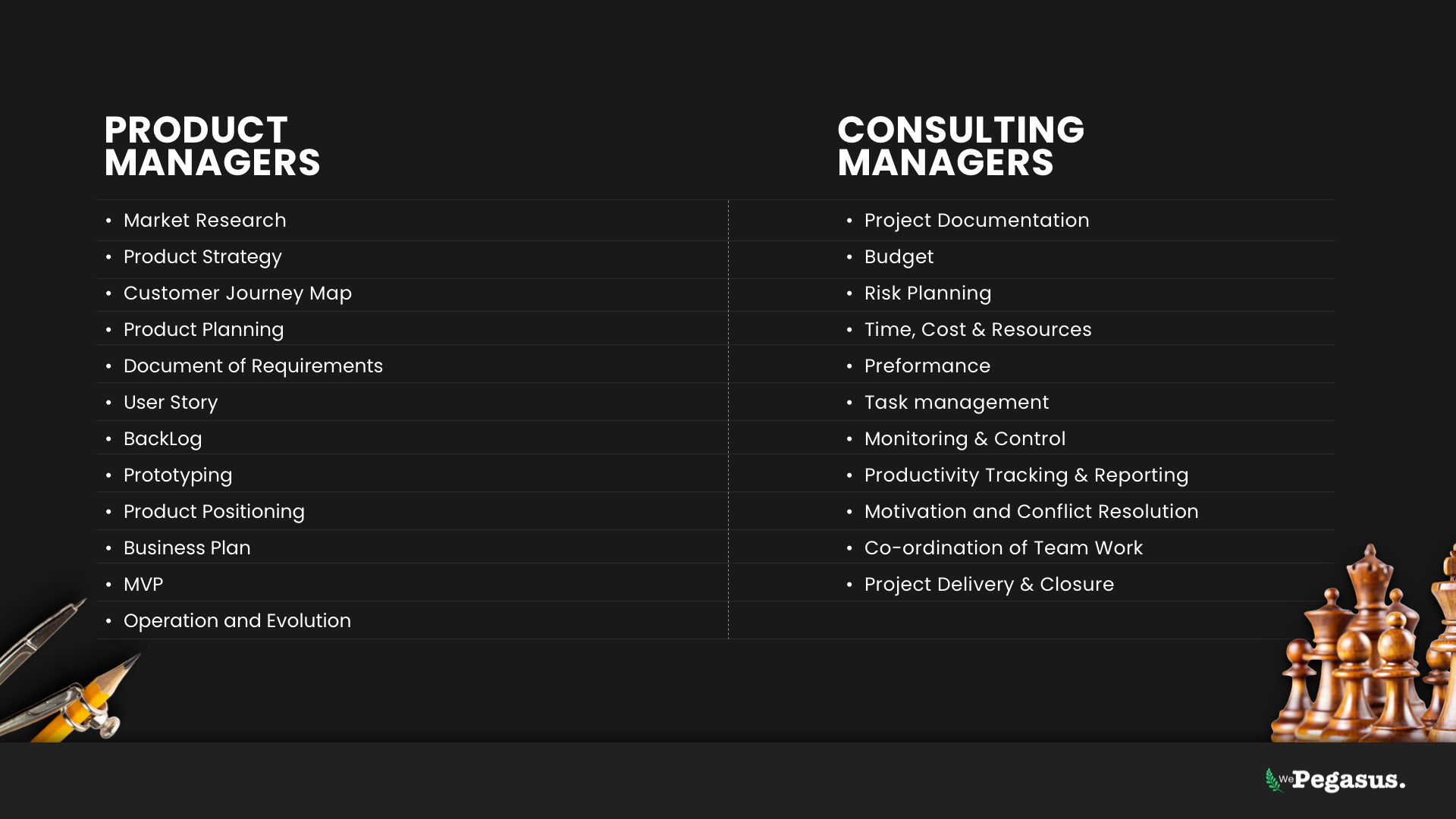It’s late evening inside the IIM Bangalore placement office. The buzz of recruiters leaving the campus lingers in the air.
Arjun, a final-year MBA student, sits with two offer letters in front of him. Consulting vs Product Roles.
One from McKinsey & Company — the consulting giant. The other from Microsoft — a Product Manager role for their fintech division.
For years, he dreamt of this very moment. But now, instead of clarity, there’s confusion.
Everyone around him has advice:
- “Consulting is the best launchpad. Nothing beats MBB.”
- “Product management is the future. Look at how tech is growing in India.”
- “Consulting has better exit opportunities.”
- “But product managers are paid more in the long run.”
This isn’t just Arjun’s story. This is the story of thousands of graduates, engineers, MBAs, and professionals across India asking the same question:
👉 Should I choose consulting or product management?
This blog is not just going to give you salary tables and bullet points. It will take you through the seed of this dilemma, the sapling of exploration, the growth of clarity, and the final blast of decision-making.
What Do These Roles Actually Mean?

Arjun decides to call his seniors.
Call 1: A consultant at BCG.
Her life sounds glamorous but exhausting. She talks about 2 AM boardroom sessions, frameworks drawn on whiteboards, and the thrill of seeing CEOs nod at her slide decks.
“We don’t own products,” she says. “We own problems. Our job is to diagnose chaos, structure it, and hand the client a roadmap. They may execute it, they may not. But for that window of time, we are their problem-solvers.”
Call 2: A product manager at Flipkart.
His story feels different. Less travel, but more firefighting.
“I don’t make slides,” he laughs. “I make trade-offs. Do we launch a feature tomorrow, even with bugs, or delay and risk losing users? I own the outcome. When the product fails, nobody looks at the engineers. They look at me.”
In that moment, Arjun learns the first big truth:
- A consultant is an advisor. They bring external perspective, frameworks, and strategies.
- A product manager is a builder. They bring ownership, coordination, and execution.
Both are problem-solvers. The difference lies in who they solve problems for.
Salary and Compensation (Growth)
Money matters. It shapes not just lifestyle, but also how much risk you can take later in your career.
Entry-Level Salaries in India
- Consultants at MBB (McKinsey, Bain, BCG): ₹22–25 LPA base + bonuses.
- Big 4 Consulting (Deloitte, EY, KPMG, PwC Strategy): ₹12–18 LPA for fresh MBAs.
- Product Managers (Microsoft, Google, Amazon): ₹20–28 LPA base + stock options.
- Startups (Flipkart, Swiggy, Zomato): ₹16–22 LPA + performance-linked bonuses.
Mid-Career Salaries (5–7 years)
- Consulting Managers: ₹35–50 LPA, sometimes higher at top firms.
- Senior Product Managers: ₹40–60 LPA in India, with FAANG roles offering $140K–160K abroad.
Long-Term Earning Potential
- Consulting: Senior Partners at MBB in India can cross ₹1 Cr+.
- Product: Directors/VPs of Product can touch ₹1–1.5 Cr, with equity creating outsized wealth if the company scales.
As Arjun’s mentor told him:
“Consulting gives you predictable raises. Product gives you asymmetric upside, especially if you join the right rocketship at the right time.”

Work-Life Balance & Lifestyle
Arjun knows that money is only one side of the coin. The other is time.
Consulting Life:
- Weekly flights. Hotel rooms as second homes. Client calls at midnight.
- Prestige and adrenaline, but unpredictability is constant.
- You serve the client’s calendar, not your own.
Product Management Life:
- Anchored to one office (or WFH).
- Nights consumed by sprint planning, bug escalations, and team conflicts.
- Still stressful, but more control over travel and weekends.
As one consultant told Arjun:
“I’ve seen five-star hotels in ten cities. But I can’t remember the last dinner with my family.”
As one PM confessed:
“I don’t travel. But sometimes I wake up thinking about a bug I can’t fix.”
So here’s the trade-off:
- Consulting = exposure to many industries, but at the cost of control.
- Product = ownership of one product, but at the cost of peace of mind.
Skills and Responsibilities
Arjun writes down what each role demands.
Consulting Roles and Responsibilities:
- Diagnose business problems.
- Build financial and operational models.
- Present solutions to clients in boardrooms.
- Skills: analytical frameworks, structured communication, Excel, PowerPoint, persuasion.
Product Manager Roles and Responsibilities:
- Set product vision and strategy.
- Write PRDs (Product Requirement Documents).
- Work with engineering, design, and marketing.
- Skills: prioritization, stakeholder management, UX understanding, leadership without authority.
The Overlap
Both need:
- Clear communication.
- Problem-solving.
- Ability to lead without direct power.
The difference is scope:
- Consultants master breadth (many industries, many clients).
PMs master depth (one product, multiple features, long-term ownership).

Career Growth and Exit Opportunities
Arjun then asks: “Where does this path lead after 5–10 years?”
Consulting Exit Opportunities:
- Private Equity (PE).
- Venture Capital (VC).
- Corporate strategy roles in Fortune 500s.
- Public policy and government advisory.
Product Management Exits:
- Startup founder (many unicorns in India have ex-PMs as founders).
- Head of Product / GM roles in large tech firms.
- Transition into VC via operator experience.
In short:
- Consultants are remembered for their thinking.
- PMs are remembered for their building.
Image Placeholder: Flowchart: Consulting → MBA/PE/VC vs Product → Startup Founder/Head of Product.
FAQs — Answering the Real Questions (Blast)
Q1: Which is a better career: consulting or product management?
👉 Neither is universally better. If you love structured problem-solving, go consulting. If you love owning outcomes, go product.
Q2: How to switch from consulting to product management?
👉 Many consultants switch after an MBA or by moving into strategy roles at product companies. Build domain expertise and technical fluency first.
Q3: What are the day-to-day tasks of a product manager in India?
👉 Writing PRDs, coordinating with engineering/design, analyzing metrics, sprint planning, firefighting bugs.
Q4: Is product management a dying career?
👉 No. It’s evolving. With AI automating grunt tasks, PMs are shifting towards more strategic leadership.
Conclusion: Your World Cup Moment
Back to Arjun at IIM.
He picked Microsoft. Five years later, he runs a product line with millions of users.
His batchmate who picked McKinsey? Now at a PE firm, shaping investments worth ₹1,000 crores.
Both are winners. Both are powerful. Both are playing at the highest level.
| The real question isn’t “Consulting vs Product — which is better?”The real question is: “Which game do you want to play like it’s your World Cup final?” |
Because whichever path you choose, you’ll be judged not by the title, but by how you play the game.
- Consultant vs. Product Manager: What’s the Difference? — Indeed https://www.indeed.com/career-advice/finding-a-job/consultant-vs-product-manager
- What Does a Product Management Consultant Do Anyway? — Mind the Product https://www.mindtheproduct.com/what-does-a-product-management-consultant-do-anyway/
- Management Consultant Salary in India 2025 (Freshers & Experienced) — upGrad https://www.upgrad.com/blog/management-consultant-salary-india-freshers-experienced/
- Should I Be A Consultant or A Product Manager? — Exponent https://www.tryexponent.com/blog/consulting-vs-pm
- The Real Difference Between Product Managers and Consultants — BuiltIn https://builtin.com/articles/product-manager-consultant-difference
- Why Former Consultants Successfully Move into Product — Faire / Craft https://craft.faire.com/why-former-consultants-successfully-move-into-product-at-faire-a706e462116f
- Salary Comparison: Consultant vs Product Manager — 6figr https://6figr.com/in/salary/consultant-or-product-manager–t
- Product Manager (Wikipedia) — role definition, responsibilities, etc. https://en.wikipedia.org/wiki/Product_manager
- Wikipedia – Product Manager (role definition)
https://en.wikipedia.org/wiki/Product_manager - UpGrad – Management Consultant Salary in India
https://www.upgrad.com/blog/management-consultant-salary-india-freshers-experienced/ - 6figr – Salary Comparison: Consultant vs Product Manager
https://6figr.com/in/salary/consultant-or-product-manager–t - BuiltIn – The Real Difference Between Product Managers and Consultants
https://builtin.com/articles/product-manager-consultant-difference - Indeed – Consultant vs Product Manager
https://www.indeed.com/career-advice/finding-a-job/consultant-vs-product-manager - Mind the Product – What Does a Product Management Consultant Do?
https://www.mindtheproduct.com/what-does-a-product-management-consultant-do-anyway/ - Exponent – Should I Be a Consultant or Product Manager?
https://www.tryexponent.com/blog/consulting-vs-pm - Faire / Craft – Why Former Consultants Successfully Move into Product
https://craft.faire.com/why-former-consultants-successfully-move-into-product-at-faire-a706e462116f


